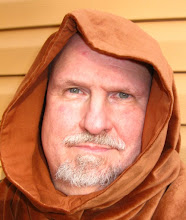If it's true that US Marines urinated on the bodies of dead Taliban, then it's regrettable and the offenders should probably be punished, but in point of fact it's not the first time Americans have pissed on the body of a dead enemy:
Meanwhile, Pattie won numerous people over to the Loyal cause. On 24 September, 500 men came in. He and his troops left Gilbert Town on 27 September. He learned of the large Rebel advance from deserters from Sevier. Pattie wrote to Cornwallis, then in Charlotte, and to Cruger at Ninety-Six for support. Cruger could spare none, and advised retreat. On 1 October, at Denard's Ford, Pattie wrote to Cornwallis that more Rebels were mustering. He reported that two old men - survivors of a party of 4 - had just been brought into camp "most barbarously maimd by a Party of Clevelands Men". The incident angered him: he used it in an impassioned proclamation that day to rally the Loyalists:
Gentlemen: Unless you wish to be eat up by an inundation of barbarians, who have begun by murdering an unarmed son before the aged father, and afterwards lopped off his arms, and who by their shocking cruelties and irregularities, give the best proof of their cowardice and want of discipline; I say, if you wish to be pinioned, robbed, and murdered, and see your wives and daughters, in four days, abused by the dregs of mankind - in short, if you wish or deserve to live, and bear the name of men, grasp your arms in a moment and run to camp.
The Back Water men have crossed the mountains; McDowell, Hampton, Shelby and Cleveland are at their head, so that you know what you have to depend upon. If you choose to be pissed upon forever and ever by a set of mongrels, say so at once and let your women turn their backs upon you, and look out for real men to protect them.
(Keep those words in mind)
Husbands was killed outright, Plummer badly wounded. Pattie himself was a conspicuous target, with his sword in his left hand, his bent-up right arm, and a checked duster-shirt protecting his uniform. A massive volley blasted him from the saddle. About a dozen balls shattered his body. His foot caught in the stirrup of his horse as he fell, and he was dragged along the ground. He died within minutes, in the arms of his friends. Jubilant Rebels stripped and urinated on his corpse, before his orderly Elias Powell and other companions were allowed to bathe and shroud him in a raw beef-hide.(¡Grande hazanas - Con muertos! to quote Goya in a later war...) He was buried in a shallow grave, beside poor Sal, from whose corpse a Rebel took a necklace of glass beads. Poll was taken prisoner, but released at Moravian Towns and returned to the army in Charlotte, where she apparently found a new protector.
"Don't kill any more! It's murder!" the Rebels' nominal commander, William Campbell protested as, with cries of "Give them Buford's play!" and "Tarleton's Quarter!", they ignored the Loyalists' white flags. Only with great difficulty did he prevent a wholesale massacre. Rebel casualties were 28 dead and 64 wounded, but 157 Loyalists were killed, and 163 so seriously hurt that they were abandoned on the mountain. Some were rescued by local Loyalists, and nursed back to health. Others were less fortunate: for weeks afterwards, turkey-buzzards, wolves and hogs fattened themselves on human carrion.
That was the Battle of King's Mountain, a battle of the American Revolution, fought on the border of North and South Carolina in 1780. It was the turning point of the Revolution in the southern colonies, and the first of the victories that led to Yorktown. "Pattie" is Major Patrick Ferguson, a Scotsman who was an officer in the British Army, who was leading American troops loyal to the Crown. On the other side were the "Overmountain Men," Indian fighters and frontiersman from what is now Tennessee.
While there are many accounts of the King's Mountain battle, not all of them mention that Ferguson's body was urinated on, and fewer still mention the letter quoted above that so provoked the Overmountain Men to treat Ferguson's corpse in such a manner. But the war in the South was fought mainly between Americans, a savage war of hatred that pitted neighbor against neighbor and in which atrocities were committed by both sides.
And that's the reality of war. Down through the centuries we've tried to clean it up and stop atrocities, with various treaties (Geneva Convention, etc.) to provide guidelines, but the sorry fact is that, since the end of WWII, none of the enemies that the US has met in battle has played by those rules, and American military men and women have been subject to torture and other atrocities. So it is in Afghanistan. Every warrior fighting against the Taliban knows that to be captured alive by them leads only to torture and beheading, so fighting to death is the common pattern. And if, after a battle, one or two of them breaks the rules and treats a Taliban like the Overmountain Men treated Ferguson, then if they're caught they have to be punished so as to preserve good order and discipline in the ranks; but don't pretend that they didn't have sufficient provocation for what they did, and try to show a little empathy for what you expect of them: they're humans just like you and me, not soulless battle robots.
Subscribe to:
Post Comments (Atom)








3 comments:
There's much to what you say. I think much of the blame for this kind of thing lies with the politicians who send our young men and women to wars with vague goals and little chance of success--hell, nobody's ever been able to even define success.
@Walt Taylor: we seem to have a pattern, since WWII, of wanting to stay in the countries we go to war with; we still have military personnel based in Germany, Japan, and South Korea, and presumably would also have them in South Vietnam if we had prevailed in that war, too. We probably could have disengaged from all three after a few years and gone back to minding our own business at home, and been the better for it.
Pretty much what I said and thought too
Post a Comment